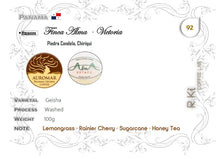AUROMAR S.A. FINCA ALMA – PANAMA
Panama, officially known as the Republic of Panama, is located on the isthmus between Central and South America, with the Caribbean Sea and North Pacific Ocean on either side of it. Much like the country’s neighbours, Costa Rica and Colombia, Panama is home to some incredible coffee. The Auromar S.A. farm, Finca Alma, is located in the highlands of Piedra La Candela, approximately 2km from the Costa Rican border, located in the North West corner of the Chiriquí. This small, privately owned and operated farm has been run by Roberto Brenes and his family since 2006. They are dedicated to the production of high quality Geishas on Finca Auromar (named after Roberto’s daughter Aurora and his granddaughter Mar) and other SHB coffees on Finca Alma.
The farm is focused on sustainable farming practices and is dedicated to preserving as much of the natural flora and fauna as possible, with approximately half their property remaining untouched highland tropical forest. The estate includes over 30 hectares, with 14.5 hectares making up the farming area and the other 16 hectares is the preserved forest, parts of which were painstakingly reforested with native flora when he took over to create a balanced self-sustaining micro-climate on the farm. Shade is provided by endemic species of trees and high-altitude Hass avocado trees, creating a highly stable micro-climate offering very little swings from day heat to night chill.
Due to the altitude, the harvest begins in late December and ends in mid-March, with the cherries benefiting from the drop in humidity during the seasonal change between December and January, and the dry summer that runs through to mid-April. The result is a limited-supply of highly complex beans in each harvest.
Part of the farms sustainability efforts is focused on their workers and associates. Most of the workers on Auromar come from vulnerable ethnic groups, who lack material and social resources, and the Brenes-Eleta family provide them with modern hygienic housing, educational opportunities and facilities, supported plantation infrastructure, and many standards in place to assure safety, efficiency and well-being.



THE PROJECT
A Family Philosophy
Auromar Panama, is a Brenes-Eleta family project, devoted to the production of high quality Geishas and other superior arabica coffees, in a sustainable, and eco friendly environment.

The Auromar Farm “Finca la Aurora” is situated between 1570 and 1770 MASL in the highlands of
Candela, Chiriquí, Republic of Panama.
The finca is comprised of 30.5 hectares (75 acres). The total farmed area is 14.5 hectares in the lower 2/3 of the elevation. The rest, 17 hectares, will remain pristine highland tropical forest in the highest parts of the property. The cultivated area has been painstakingly developed to strike a balance between coffee yields and forest preservation.
Shade is provided by endemic species of trees and high-altitude Hass avocado trees. As shade is much heavier than in other farms in the region (1-4), the area enjoys a stable microclimate offering very little swings from day heat to night chill. Also, because of altitude, the harvest begins late in December and ends in mid-March.
The cherries take full benefit of the drop in humidity between December and January at seasons' change, and the sunny dry summer that runs through mid-April.
The outcome of such combination, forest, shade and late harvest is a limited-supply, highly complex beans in each harvest.
THE HUMAN FACTOR
Labor and Human Development
All the steps in the process of growing, harvesting, selecting, and processing a coffee cherry to a green bean ready for export, demands knowledge, judgement and care from our employees and associates.
In the Panama Geisha terroir, we are blessed to count with labor that makes quality farming possible, the Gnabe- Bugle natives.
Famously parsimonious and patient, they handle and harvest the coffee grain-by-grain without tearing the shrub nor collecting green cherries.
To encourage and reward their caring attitude, we have an incentive system, a premium well above prevailing wages, for carefully picking the ripest cherries and protecting the coffee trees.
Traditionally the Gnabe have been a nomad workforce with all the economic and social problems and handicaps that such condition entails.
To mitigate these problems and to help raise their living standards, we have committed resources to improve their working skills. We reach them by improving their technical skills and incentives to improved knowledge through continued training and regular on the job remedial valuations.


Good coffee cherries demand a lot more than farming and processing to become an excellent cup of coffee. We spend time and efforts so that coffees are milled correctly, selected manually almost to perfection, later vacuum packed and finally boxed by hand, one at a time.
The process is very straightforward. Coffee beans are let to rest until we have definite shipment dates. Then, in a very compressed timetable, we mill, select and pack the
orders trying to deliver coffee as fresh as feasible.
All our coffee travel in sealed vacuum bags and snugly set-in high-grade carton boxes. High value geishas we preferably send air freight, the promptness and quality handling of delivery, more than justify the extra costs.
You may also like
-
Drip Bag box (10g x 10 pack)
![]()
- Regular price
- from ¥151.58
- Sale price
- from ¥151.58
- Regular price
-
- Unit price
- per
Sold out -
Panama-2024 Lamastus Family Estate Auction Lot #17 Abstract El Burro Geisha Natural ASD
![]()
- Regular price
- from ¥182.94
- Sale price
- from ¥182.94
- Regular price
-
- Unit price
- per
Sold out -
Ethiopia-Alo Coffee-Bona Zuria Washed 74110
![]()
- Regular price
- ¥109.77
- Sale price
- ¥109.77
- Regular price
-
- Unit price
- per
Sold out -
Café Granja La Esperanza--Sudan Rume Washed
![]()
- Regular price
- ¥193.40
- Sale price
- ¥193.40
- Regular price
-
- Unit price
- per
Sold out









